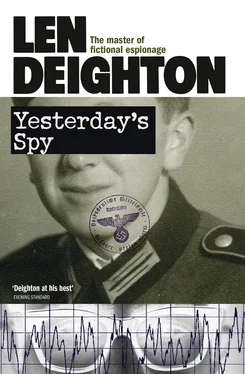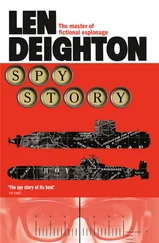‘But Hitler and Stalin have signed the peace pact. In Lyon the Communists are even publishing a news-sheet.’
Frankel looked up at me, trying to see if I was being provocative. He said, ‘Some of them are even wearing the hammer and sickle again. Some are drinking with the German soldiers and calling them fellow workers, like the Party tells them to do. Some have resigned from the Party in disgust. Some have already faced firing squads. Some are reserving their opinion, waiting to see if the war is really finished. But which are which? Which are which?’ He sipped his tea and then said, ‘Will the English go on fighting?’
‘I know nothing about the English, I’m an American,’ I insisted. ‘My office wants a story about the French Communists and how they are reacting to the Germans.’
Frankel moved the US passport to the end of the row. It was as if he was tacitly dismissing my credentials, and my explanations, one by one. ‘The people you want to see are the ones still undecided.’
He looked up to see my reaction.
‘Yes,’ I said.
‘The ones who have not signed a friendship treaty with the Boche, eh?’
I nodded.
‘We’ll meet again on Monday. What about the café in the arcade, at the Place Massena. Three in the afternoon.’
‘Thank you, Mr Frankel. Perhaps there’s something I can do for you in return. My office have let me have some real coffee …’
‘Let’s see what happens,’ said Frankel. But he took the tiny packet of coffee. Already it was becoming scarce.
I picked up the documents and put them into my pocket. Frankel watched me very closely. Making a mistake about me could send him to a concentration camp. We both knew that. If he had any doubts he’d do nothing at all. I buttoned up my coat and bowed him goodbye. He didn’t speak again until I reached the door. ‘If I am wearing a scarf or have my coat buttoned at the collar, do not approach me.’
‘Thank you, Mr Frankel,’ I said. ‘I’ll watch out for that.’
He smiled. ‘It seems like only yesterday,’ he said. He poured the tea. ‘You were too young to be a correspondent for an American newspaper, but I knew you were not working for the Germans.’
‘How did you know that?’
He passed the cup of tea to me, murmuring apologies about having neither milk nor lemon. He said, ‘They would have sent someone more suitable. The Germans had many men who’d lived in America long enough. They could have chosen someone in his thirties or forties with an authentic accent.’
‘But you went ahead,’ I reminded him.
‘I talked to Marius. We guessed you’d be bringing money. The first contact would have to bring money. We could do nothing without cash.’
‘You could have asked for it, or stolen it.’
‘All that came later – the bank hold-ups, the extortion, the loans. When you arrived we were very poor. We were offering only a franc for a rifle and we could only afford to buy the perfect Lebel pattern ones even then.’
‘Rifles the soldiers had thrown away?’ It was always the same conversation that we had, but I didn’t mind.
‘The ditches were full of them. It was that that started young Marius off – the bataillon Guernica was his choice of name – I thought it would have been better to have chosen a victory to celebrate, but young Marius liked the unequivocally anti-German connotation that the Guernica bombing gave us.’
‘But on the Monday you said no,’ I reminded him.
‘On the Monday I told you not to have high hopes,’ he corrected me. He ran his long bony fingers back into his fine white wispy hair.
‘I knew no one else, Serge.’
‘I felt sorry for you when you walked off towards the bus station, but young Marius wanted to look at you and make up his own mind. And that way it was safer for me, too. He decided to stop you in the street if you looked genuine.’
‘At the Casino tabac he stopped me. I wanted English cigarettes.’
‘Was that good security?’
‘I had the American passport. There was no point in trying to pretend I was French.’
‘And Marius said he might get some?’
‘He waited outside the tabac. We talked. He said he’d hide me in the church. And when Champion returned, he hid us both. It was a terrible risk to take for total strangers.’
‘Marius was like that,’ said Frankel.
‘Without you and Marius we might never have got started,’ I said.
‘Hardly,’ said Frankel. ‘You would have found others.’ But he smiled and was flattered to think of himself as the beginning of the whole network. ‘Sometimes I believe that Marius would have become important, had he lived.’
I nodded. They’d made a formidable partnership – the Jewish Communist and the anti-Fascist priest – and yet I remembered Frankel hearing the news of Marius’s death without showing a flicker of emotion. But Frankel had been younger then, and keen to show us what his time in Moscow had really taught him.
‘We made a lot of concessions to each other – me and Marius,’ Frankel said. ‘If he’d lived we might have achieved a great deal.’
‘Sure you would,’ I said. ‘He would be running the Mafia, and you would have been made Pope.’
Flippancy was not in the Moscow curriculum, and Frankel didn’t like it. ‘Have you seen Pina Baroni yet?’
‘Not yet,’ I said.
‘I see her in the market here sometimes,’ said Frankel. ‘Her little boutique in the Rue de la Buffa is a flourishing concern, I’m told. She’s over the other business by now, and I’m glad …’
The ‘other business’ was a hand-grenade thrown into a café in Algiers in 1961. It killed her soldier husband and both her children. Pina escaped without a scratch, unless you looked inside her head. ‘Poor Pina,’ I said.
‘And Ercole …’ Frankel continued, as if he didn’t want to talk of Pina, ‘… his restaurant prospers – they say his grandson will inherit; and “the Princess” still dyes her hair red and gets raided by the social division.’
I nodded. The ‘social division’ was the delicate French term for vice squad.
‘And Claude l’avocat ?’
‘It’s Champion you want to know about,’ said Frankel.
‘Then tell me about Champion.’
He smiled. ‘We were all taken in by him, weren’t we? And yet when you look back, he’s the same now as he was then. A charming sponger who could twist any woman round his little finger.’
‘Yes?’ I said doubtfully.
‘Old Tix’s widow, she could have sold out for a big lump sum, but Champion persuaded her to accept instalments. So Champion is living out there in the Tix mansion, with servants to wait on him hand and foot, while Madame Tix is in three rooms with an outdoor toilet, and inflation has devoured what little she does get.’
‘Is that so?’
‘And now that he sees the Arabs getting rich on the payments for oil, Champion is licking the boots of new masters. His domestic staff are all Arabs, they serve Arab food out there at the house, they talk Arabic all the time and when he visits anywhere in North Africa he gets VIP treatment.’
I nodded. ‘I saw him in London,’ I said. ‘He was wearing a fez and standing in line to see “A Night in Casablanca”.’
‘It’s not funny,’ said Frankel irritably.
‘It’s the one where Groucho is mistaken for the Nazi spy,’ I said, ‘but there’s not much singing.’
Frankel clattered the teapot and the cups as he stacked them on the tray. ‘Our Mister Champion is very proud of himself,’ he said.
‘And pride comes before a fall,’ I said. ‘Is that what you mean, Serge?’
‘ You said that!’ said Frankel. ‘Just don’t put words into my mouth, it’s something you’re too damned fond of doing, my friend.’
Читать дальше












